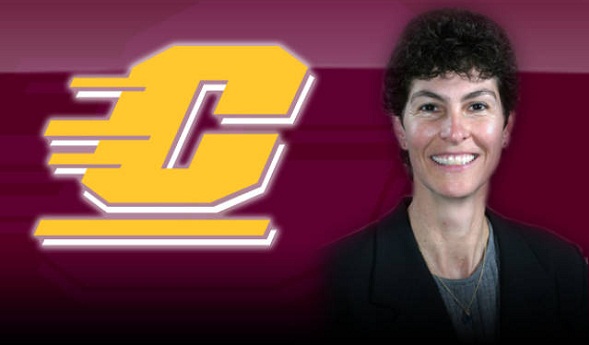
Lessons Learned Keep Paying Off
February 8, 2013
By Terri Finch Hamilton
Reprinted with permission of CMUChippewas.com
Gina Mazzolini's parents taught her to be a good person first, a good student second, and a good athlete after that. But Mazzolini says her involvement in sports at CMU taught her things that went way beyond the classroom.
"At Central, I learned women are just as good as men -- or better," says Mazzolini, assistant director at the Michigan High School Athletic Association. "I learned that if we put our minds to it, we can do anything."
A star athlete in volleyball and basketball at CMU from 1974 to 1978, Mazzolini says college sports helped her soar after the limitations for girls in high school sports in the early 1970s.
"In high school, women were always taking the back seat to men," says Mazzolini, 57. "I didn't see women in leadership positions in high school. Girls couldn't use the weight room -- we had to sneak in, then we'd get kicked out. They'd look at me and say, 'Why would you want to lift weights?'
"When the guys were done with the gym, then we could use it."
As an athlete at St. Johns High School, Mazzolini was just starting to compete competitively, she says. She won the school's first ever female athlete of the year award.
"Then I went to Central Michigan, and my teammates were all the best kids from their high school teams. Suddenly, everybody was good. And everybody we played against was good."
It was eye opening, she says.
"You learn a lot about yourself," she says. "If you can survive a practice, if you can survive playing Michigan State, you get confidence. I realized I was good. I learned how to be competitive, in a good way."
In basketball, she led the Chippewas in scoring and rebounding three straight seasons - averaging in double figures in both categories. After graduating from CMU, Mazzolini went on to teach and coach at the high school and college levels. She was inducted into the CMU Athletic Hall of Fame in 1992.
A few years later, Mazzolini received the 2009-10 Women In Sports Leadership Award by the Representative Council of the MHSAA.
So much of what she learned on the college volleyball and basketball courts prepared her for later success, Mazzolini says.
"In athletics, you can't worry about what just happened," she says. "You control your emotions, you take a deep breath, you move forward."
Good advice on any day, she says.
"You learn that you don't always win, and you learn to take defeat gracefully," she says. "Later, in your business life, you're not going to win everything, either. Sports teaches you how to deal with setbacks, how to work hard and rearrange your goals so that you do better next time.
"You learn if you work together, you can achieve amazing things."
CMUChippewas.com is running a series of stories to celebrate the 40th anniversary of Title IX legislation. Click to see more of the series.

Statement on Spectators, Winter Contact Sports
January 22, 2021
Second Half
The following statements are attributable to Mark Uyl, executive director of the Michigan High School Athletic Association, in response to today’s announcements by Governor Gretchen Whitmer and the Michigan Department of Health and Human Services (MDHHS) on the topics of spectators and Winter contact sports.
Governor Whitmer and MDHHS announced that sports arenas with capacities of at least 10,000 spectators may allow up to 500 to attend events. However, no additional tickets will be sold for today and Saturday’s 11-Player Football Finals at Ford Field.
“We have been planning these Finals for weeks to include immediate family, and unfortunately this isn’t a process we can adjust midstream,” Uyl said. “Distributing more tickets would put stress on those plans and Ford Field staffing, and force schools to make more hard decisions on who will be able to attend, but at the last second instead of with prior planning.”
Governor Whitmer and MDHHS also announced that Winter contact sports – including MHSAA activities in girls and boys basketball, competitive cheer, ice hockey and wrestling – must remain non-contact through Feb. 21. The previous emergency order was set to expire at the end of January and would’ve allowed those sports to begin contact activities Feb. 1.
“We found out about this decision at 9:30 a.m. like everyone else, and we will address it as quickly as possible after taking the weekend to collect more information,” Uyl said. “We did not anticipate this delay in winter contact practices and competition, and today’s announcement has created many new questions.
“Obviously, this is disappointing to thousands of athletes who have been training with their teams over the last week and watching teams in other states around Michigan play for the last two months.”

